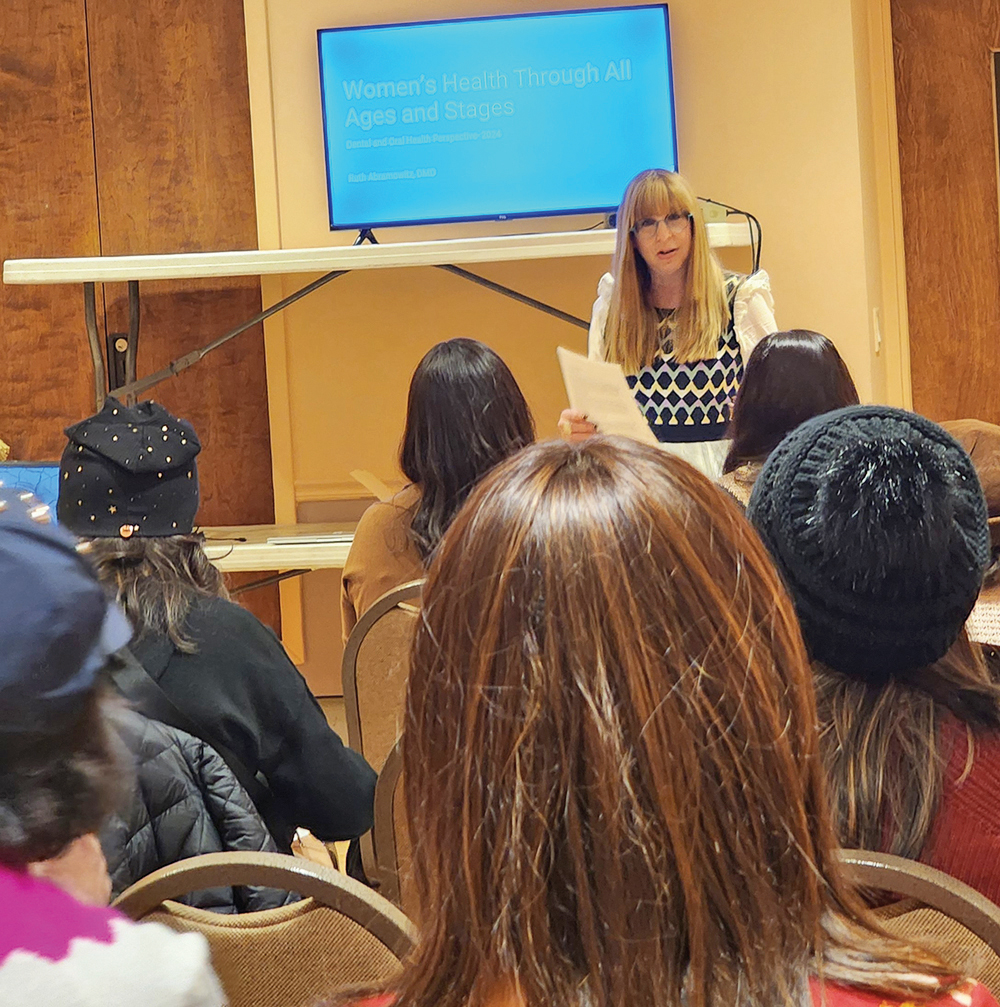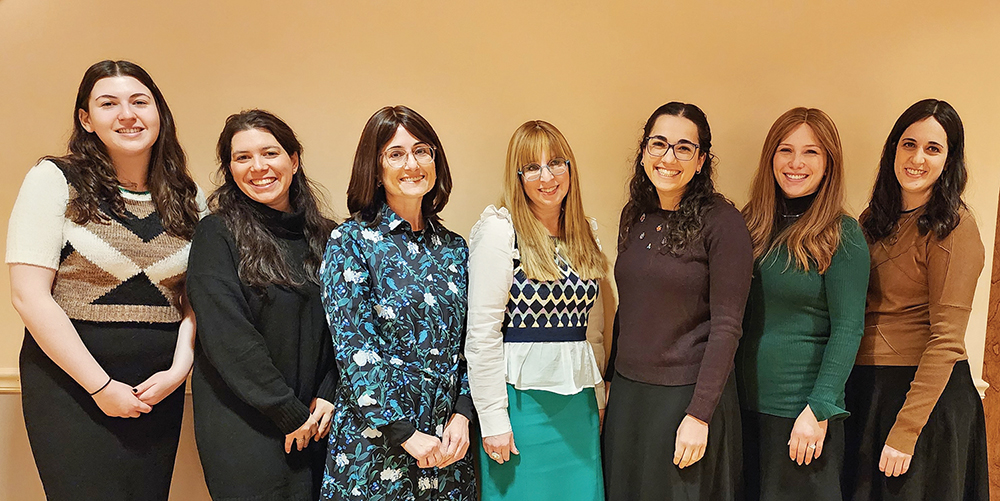
Several dozen women from the broader Highland Park/Edison community gathered at Congregation Ohav Emeth (OE) on Sunday morning, February 25 for their inaugural Women’s Health Symposium. The program featured seven speakers on different topics covering “Women’s Health At All Ages and Stages.”
Organizer Dr. Chani Miller, OD noted that the idea for the event came from a Zoom meeting held by Nshei Ohav Emeth to discuss programming for the year. The topic of “health” resonated with the group and the seed of the idea blossomed into the event that was “created by women for women. I reached out to friends of mine who are also in healthcare and they agreed to speak. All of the speakers either live in Highland Park now or grew up here, which also made it meaningful to those attending.”
Following communal tehillim led by Rebetzin Debby Kaufman, Ruth Abramowitz, DMD started the program by discussing the importance of good dental hygiene from the appearance of a child’s first tooth through their senior years. She untangled the perspective of a baby’s use of a pacifier as perceived by pediatricians, dentists and ENTs, with a summarization that pacifiers should be discontinued before the child is four years old to prevent permanent skeletal changes. As a child grows up, “poor oral health leads to ailments that contribute to school absenteeism.” Other sections of the talk listed how hormonal changes associated with puberty, pregnancy and aging can adversely impact oral and physical health and that more frequent visits to a dentist may be necessary at various life stages.

Nicole Dietz, a labor and delivery nurse, discussed postpartum depression and shared the statistic that while “one in eight women experiences it, what happens to the other seven women after they give birth? Because it can’t be that you either have a major depressive disorder or you’re totally fine?” She introduced “matrescence,” an anthropological term that describes the physical, psychological and emotional changes women go through when they become mothers. Matrescence acknowledges that it’s normal to have feelings of sadness and “loss of self” following this huge life change. Many in the audience had not heard of the term and it resonated deeply with many who had trouble adjusting to motherhood and felt that there was something terribly wrong with them.
“Normalizing conversations about topics like this was one of the goals I had for this program and it confirmed that programs like these are imperative,” said Miller.
First year pediatric resident Avigayil Dietz, DO spoke about the importance of, and misconceptions associated with, the HPV vaccine. Orthodox communities may presume that their lifestyle negates the need for the HPV vaccine, but Dr. Dietz presented compelling reasons why having the vaccine at the recommended timing of ages 9-15 is beneficial.
Sara Feigenbaum, DPT covered the importance of pelvic health for women and “improving their quality of life and empowering them to get to know their bodies and raising awareness of issues that are not generally talked about.”
Miller spoke about the importance of the treatment of “dry eye” in women and the differences in dry eye studies regarding men and women. While the topic may appear to be more of an annoyance than a serious medical issue, it also can be painful and may lead to blindness. Hormonal shifts through a woman’s life can impact the secretions that can lead to dry eye as can the over-reliance on technology and devices that limit the number of times we blink. Miller recommends looking 20 feet away for 20 seconds for every 20 minutes of screen time to maintain eye health.
Daniella Miller, MS, MD/PhD candidate, spoke about “Taking Charge of Your Genetic Makeup.” Tay Sachs disease and breast cancer are known to be of increased risk among the Ashkenazi Jewish population, but there are also other diseases that are prevalent in other Jewish groups. She stressed the importance of early genetic testing and not waiting until a couple is pregnant to find out if one parent is a carrier. “Destigmatizing carrier status to prevent future issues is critical.”

A discussion on the importance of mental health by Rachel Teicher Yarmush, LSW concluded the event. Women spend most of their time taking care of their families and less time caring for themselves. It is important that women care for themselves so they can continue all they do. Women should be aware of resources that are available and know that mental and emotional health is as important as physical health.
Simone Fisch attended the event because the topics not only sounded interesting but are important to know and understand. Marilyn Berger retired from the medical field, but came to “hear updates and changes that are important.”
According to Miller, ”OE is very supportive of women’s programming, and women’s health is part and parcel of that—everyone was very encouraging. After the program one of the women’s husband’s later told me that he wishes that there could be a program like this for men as well.
Many medical topics relating to women’s health are stigmatized; often this is due to both shame and ignorance about the topic and this is especially true in the observant Jewish community where traditionally in the past these topics were considered off limits. Things have thankfully changed a lot, but there are still topics, particularly those surrounding reproductive health, that are not discussed as often as they should be and one of my goals is to normalize and destigmatize these conversations. I think today’s program definitely accomplished that!”








